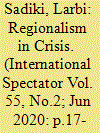| Srl | Item |
| 1 |
ID:
178586


|
|
|
|
|
| Summary/Abstract |
This article assesses how the decisions taken in and after 2011 in Doha, Abu Dhabi, and Riyadh strained and shattered the lingering consensus and common threat perception that had, since 1981, provided a baseline for regional cooperation within the Gulf Cooperation Council (GCC). It explores how the rifts after 2011 have hit on weak-points within the GCC in ways that complicate any potential recoherence or “coming-back-together” in anything close to the pre-2017 form. This occurred as the pragmatic flexibility within the GCC was eroded by a “zero-sum” mentality that has split GCC states along multiple lines rather than just a “clean” break over a specific issue. While the relationship between Riyadh and Abu Dhabi has become a new and exclusionary center of gravity in Arab Gulf politics, the article ends by examining the prospects for regional order against the backdrop of a fractured GCC and the prospects for greater balance as the disengagement of US interest accelerates the internationalization of the political economy and international relations of Persian Gulf states.
|
|
|
|
|
|
|
|
|
|
|
|
|
|
|
|
| 2 |
ID:
176537


|
|
|
|
|
| Summary/Abstract |
At the core of “disembedded regionalism” in the Gulf Cooperation Council (GCC) is an incapacity to foster more representative forms of politics that are responsive to citizens. Instead, elite-to-elite relations are a salient feature that characterises Gulf politics. A radical re-reading of Jürgen Habermas and John Rawls, applied to the GCC in the first two decades of the 21st century, confirms that top-down management of politics is conducive to conflict and disintegration as against integration, marginalising the agenda of multi-level governance within the subregion. Set against the backdrop of the current blockade/crisis, this critical rendition throws into sharp relief the non-democratic brand of GCC regionalism.
|
|
|
|
|
|
|
|
|
|
|
|
|
|
|
|